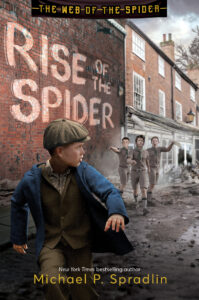“Web of the Spider in the Classroom”
Having written a great deal of historical fiction for young readers, I’ve been considering the inherent value of this genre for middle graders for some time. Is learning about the past through fiction a viable methodology? Or should we only stick to studying…the past? I know that professional educators, librarians and smarter than me writers have long wrestled with this question.
I can only speak from anecdotal experience, but that experience tells me the answer is a resounding yes. My historical novel Into the Killing Seas, based on the true story of the sinking of the USS Indianapolis during World War II, has probably generated more reader mail to me than any of my books. And a common and consistent thread running through all of those letters was how many of those students were so intrigued by the true story that they had turned it into a research project and had gone on to read one or several of the excellent non-fiction books about the disaster. As the song says, “reader, you make my heart sing.” (I know it doesn’t really say that, but this is my piece, and I can do what I want).
My earlier historical fiction (I call them the World War II Adventures Series) had been centered around a group or person who experienced the war through a great deal of pain and hardship. The challenge with writing THE WEB OF THE SPIDER series is that it revolves around the rise of Nazism in pre-war Germany. Beginning in 1929, when Hitler’s movement is starting to pick up steam. His two fold strategy was working. One, he blamed the Treaty of Versailles for being unnecessarily punitive to Germany. And two, he placed the rest of the blame for Germany’s struggles squarely on the back of its Jewish citizens.
In the first book, The Rise of the Spider, we are introduced to Rolf, a twelve year old boy, living in the quaint village of Heroldsberg. It is a gorgeous place, just a few kilometers from Nuremberg, and while people are struggling, things are not as bad in Heroldsberg as they are in the rest of the country. Rolf and his best friend Ansel, spend their days at school, playing football (European) and wandering the woods and waters nearby. Rolf lives with his older brother Romer and his Papa who owns a toy factory in Nuremberg. His mother passed away from the Spanish Flu when Rolf was born in 1918. His life is quiet and fairly people until one day when two young men arrive in town.
They are representatives of the Hitler Youth, here to establish a chapter in Heroldsberg. To Rolf, there is something off about them. Their actions are a little too deliberate, their hair and clothing are too perfect, and their words too carefully chosen. With warning bells going off, Rolf decides to ignore and stay away from them. But he is alarmed when his brother Romer, becomes enamored by their words.
Things deteriorate rapidly. Romer is further drawn in and when a Jewish business is burned, Rolf suspects Romer had something to do with it. When Romer makes a decision to join the Hitler Youth his family is splintered even further, and more unrest takes place in the village.
When Romer finally runs away, Rolf and his Papa race to the Nuremberg Rally grounds, where Hitler is speaking during the Nuremberg Rally, but they are too late. When a violent riot erupts, they are caught up in it. And in the aftermath of violence, Rolf will need to make a choice between his family and his country.
Dealing with topics like political violence, socio-economic theory, and antisemitism and distilling it down to a middle grade audience, while keeping up the action, suspense and intrigue was probably the most challenging writing I’ve ever done. And my hope is that his book will help readers have a beginning understanding for the problems and social issues that we still face today. It is unfortunate that recent events have resulted in a new wave of violence and antisemitism. What is old is new again.
But maybe, just maybe, my little book can help.
Working with a reading specialist, I have created a curriculum/teaching guide that I hope will prove useful in leading discussions about The Rise of the Spider.
Web of the Spider: Book 1, The Rise of the Spider
Introduction:
Historical fiction has repeatedly shown us, that certain stories and narratives can serve as powerful windows into the past. It can offer educators and students opportunities to delve into pivotal moments in history. The Rise of the Spider is set in 1929 Germany, where a young boy named Rolf and his best friend Ansel find themselves caught in the crosshairs of political upheaval. I hope this story will help educators explore the value of historical fiction in the context of teaching history and fostering critical thinking skills.
Plot Overview:
The story unfolds in the quiet town of Heroldsberg, where Rolf and Ansel witness the ominous arrival of Hans and Nils, members of the Hitler Youth. The plot takes a poignant turn as the friends watch in horror as Rolf’s brother Romer becomes entangled in their web of recruitment. The novel begins to shed light on the rise of totalitarian ideologies and the impact they had on communities during a crucial period in history.
Themes for Classroom Discussion:
- The Power of Propaganda:
- Use the book as a jumping off point to discuss the role of propaganda in shaping public opinion during the 1920s and 1930s. Compare to how political propaganda is used today.
- Encourage students to analyze propaganda materials of the time, fostering media literacy skills. Be sure to be careful in using these materials as the can be disturbing.
- Youth and Ideological Indoctrination:
- By 1933, the Hitler Youth had replaced all other youth programs in Germany. Discuss the role of recruiting young people into political causes during other periods of history.
- Discuss the ethical implications of using young people to facilitate political change.
- Family Dynamics During Political Upheaval:
- A person’s political beliefs can have a positive or negative impact on family dynamics. Discuss the role politics can play in a family life.
- Encourage students to reflect on how political beliefs can strain familial bonds and create internal conflicts.
Teaching Strategies:
- Historical Inquiry Projects:
- Assign projects that prompt students to investigate the socio-political climate of 1929 Germany.
- Have them present findings through multimedia formats, fostering research and presentation skills.
- Character Analysis:
- Guide students in conducting in-depth character analyses, exploring the motivations and conflicts faced by Rolf, Ansel, and Romer. How are they alike? How are they different?
- Connect character development to broader historical themes. How does Rolf’s journey compare to other both fictional characters and real people from history.
Published September 24th, 2024 by Margaret K. McElderry Books
About the Book: Witness the chilling rise of Hitler’s Germany through the eyes of a twelve-year-old boy in this first book in the action-packed middle grade series Web of the Spider for fans of I Survived and A Night Divided.
1929, Heroldsberg, Germany. Rolf might only be twelve years old, but he’s old enough to know that things have not been good in his country since the end of the Great War. Half of Germany is out of work, and a new political movement is taking hold that scares him. Every night, Rolf’s father and older brother, Romer, have increasingly heated arguments about politics at the dinner table. And when two members of the new Nazi Party, Hans and Nils, move to town as part of the Hitler Youth, Rolf is uneasy to see how enamored Romer is by their promises of bringing Germany to glory.
Rolf doesn’t trust Hans and Nils for a moment. For all their talk of greatness, they act more like bullies, antagonizing shop owners who are Rolf’s friends and neighbors. Yet Romer becomes increasingly obsessed with their message of division, and Rolf watches in horror as his family fractures even further.
When there is an act of vandalism against a Jewish-owned business in town, Rolf fears Romer might have had something to do with it. Can Rolf find a way to intervene before things get any worse?
About the Author: Michael P. Spradlin is the New York Times bestselling and Edgar Award–nominated author of the Spy Goddess series, The Youngest Templar series, and the Web of the Spider series, as well as several works of historical fiction, including the Western Heritage Award winning Off Like the Wind: The Story of the Pony Express. He currently resides in Lapeer, Michigan, with his wife, daughter, and his schnoodle, Sequoia. Learn more at MichaelSpradlin.com.
Thank you, Michael, for sharing this teaching guide!



1 thought on “Author Guest Post: “Web of the Spider in the Classroom” by Michael P. Spradlin, Author of Rise of the Spider”